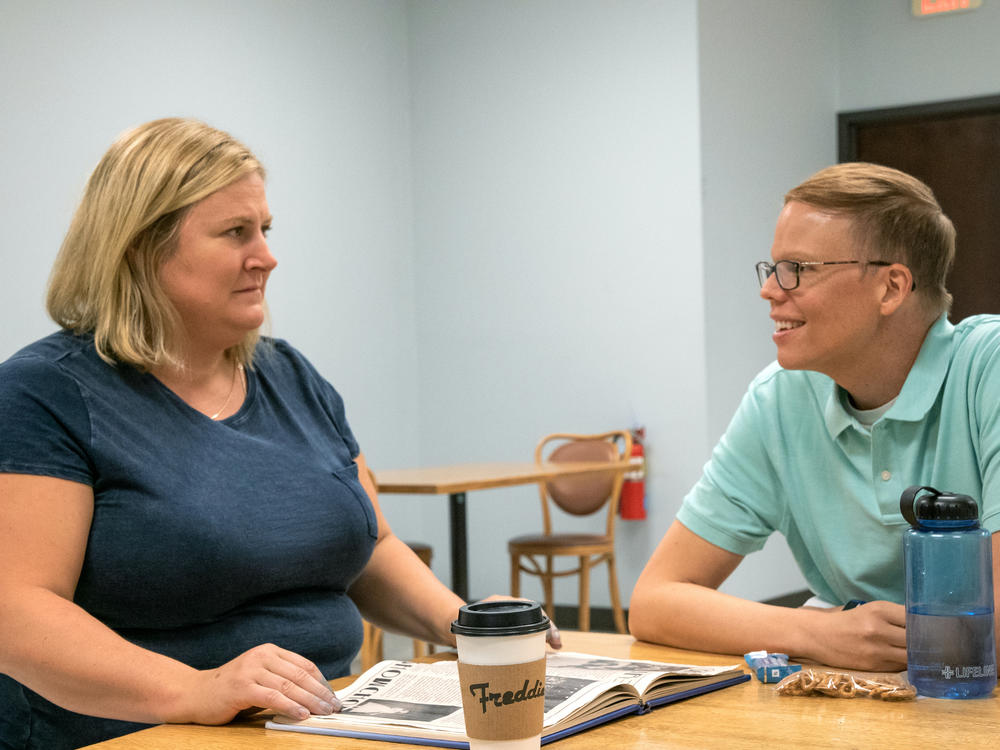Section Branding
Header Content
HBO's 'Somebody Somewhere' sings sweetly and sincerely, albeit with its inside voice
Primary Content
It's impossible to watch actor, comedian and singer Bridget Everett in action on a cabaret stage without surrendering to the experience and goggling like a fool. She's hilarious, filthy and so supremely comfortable with her voice, her body and her sheer, scintillating presence that she casts a spell over the audience. There's also the fact that to watch her in action on the cabaret stage means watching her in action off of it — she spends a good deal of her act gleefully prowling the crowd to flirt, accost, challenge, embrace and rebuff audience members, one by one.
If you're familiar with Everett's nightclub act, you'll likely spend at least the first few minutes of her new HBO series Somebody Somewhere in a puzzled haze of cognitive dissonance. As Sam, a woman who moved back to her hometown to take care of her dying older sister and spent the last six months or so nursing her grief, the electrifying performer runs at a low voltage.
That's fully intentional, as is the fact that there's nothing broadly or archly comedic about the semi-autobiographical series. Yes, the premise bears some passing similarity to the classic sitcom fish-out-of-water trope — we learn that Sam moved away to the big city a while back, and now feels alienated from her hometown. But the difference is one of degrees: Her hometown is "the eighth-biggest town in Kansas!" as one character sardonically notes. The "big city" she recently moved back from? Lawrence, Kansas — the state's sixth-biggest town.
Getting unstuck, rediscovering a voice
Sam, as the series opens, is stuck. She's living in her late sister's house, but still sleeping on the couch. She's found work grading standardized tests, but refuses to engage with her co-workers. She dotes on her niece (Kailey Albus), but to do so must put up with the withering disdain of her sister Tricia (Mary Catherine Garrison), the worrisome drinking of her mother (Jane Brody) and the beaten-down passivity of her father (Mike Hagerty).
Life in the Manhattan, Kansas of the series isn't idealized, but neither is it condescended to. Informed by Everett's life experience (she grew up there), the show seems determined to grant its characters a refreshing self-awareness — one that, crucially, isn't tied to notions of leaving their hometown, and the community it affords, behind.
It does so by having Sam stumble across a gathering of outsiders called Choir Practice which, though it meets at a church space in a dying mall, isn't officially sanctioned by any religious institution. Instead, it's a space where queer and queer-adjacent residents of the town can gather to celebrate and — here's where Sam's story comes in — to perform.
Emceed by the charismatic Fred Rococo (drag king Murray Hill), Choir Practice is the brainchild of Sam's co-worker Joel (UCB regular Jeff Hiller), who remembers her — and her astonishing voice — from high school.
Hiller's the show's not-so-secret weapon. He invests the awkward, gay, religious Joel with a bracingly clear, and defiantly queer, self-actualized confidence. He matter-of-factly loves where he lives, and rebuffs Sam's unthinking, reflexive condescension towards it. It's he who urges her to attend Choir Practice and, ultimately, to get up in front of everyone and do what she (both Sam the character and Everett the performer) was born to do.
Those of us who've witnessed Everett onstage might expect the series to ditch its muted, low-key energy here, to show us a woman rediscovering her voice once and for all — and show us how that moment feels to her: We might expect a dramatic change of lighting, and a lush sound mix that defies the modest instrumentation visible onstage behind her. We might even expect a full-on musical-comedy fantasy number, replete with sudsy production elements like costumes and choreography.
What we get instead is a woman who's convinced herself she's never good enough, remembering how much she loves to sing — haltingly, at first, then slightly more confidently. (The choice of song in question — the treacly Peter Gabriel/Kate Bush ballad "Don't Give Up" — might divide viewers; some (hi!) will find it too on-the-nose is a precious way, others will simply accept it for what it is, a small, lovely moment.)
Somebody Somewhere knows that rediscovering your purpose, especially after a long period spent struggling with grief, doesn't happen in a lightning flash. It's a piecemeal process that requires you to examine why you forgot yourself in the first place. And that's what the series is truly about — Sam untangling the various factors that have acted upon her (her sister's judgement, her mother's alcoholism, her own need to keep others at a distance) to rob her of her access to joy.
Over the season's seven episodes, there are other nights at Choir Practice, other opportunities for her to embrace her love of performance. At the end of the seventh and final episode, Sam isn't light-years from where she was when it began — but she's not stuck where she was.
Not every storyline slots neatly into the series' prevailing low-fi, low-intensity mood; a series of scenes where Sam and Joe trail her sister's husband (Danny McCarthy) in a car seem to belong to another, more antic show entirely.
Mostly, though, Somebody Somewhere offers a modest, refreshingly clear-eyed take on the struggle to reinsert yourself into life, and grant yourself dispensation to find joy in the shadow of loss. That's not the kind of song Everett might belt out at the top of her voice in her cabaret act, but it's one she sings here with a bracingly honest precision, clarity and earned emotion.
Copyright 2022 NPR. To see more, visit https://www.npr.org.

